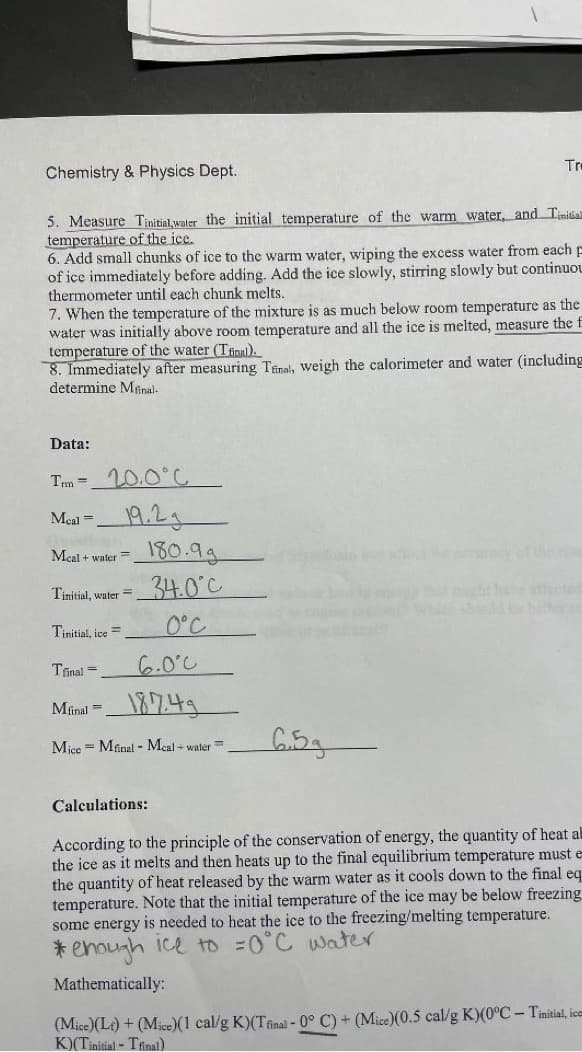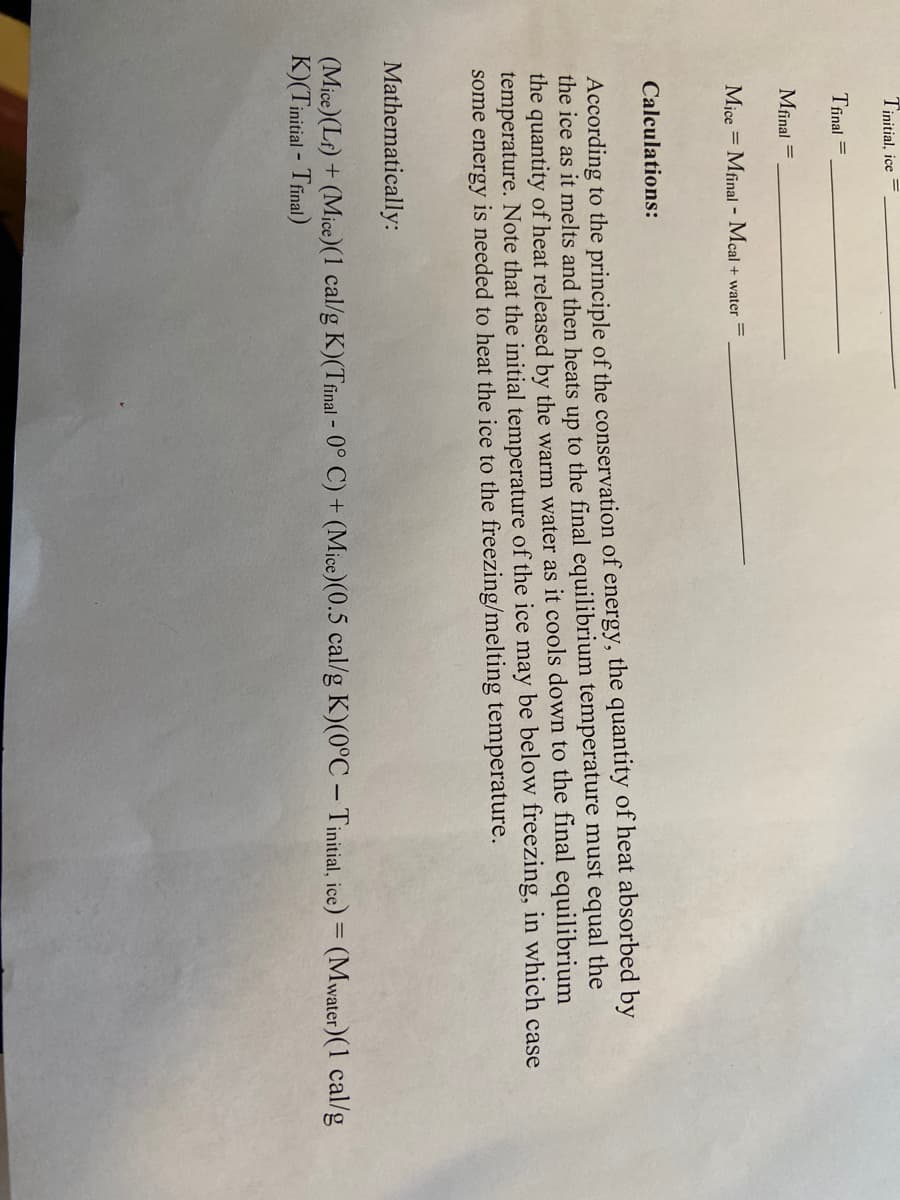5. Measure Tinitial, water the initial temperature of the warm water, temperature of the ice. 6. Add small chunks of ice to the warm water, wiping the excess water from each of ice immediately before adding. Add the ice slowly, stirring slowly but continuo- thermometer until each chunk melts. 7. When the temperature of the mixture is as much below room temperature as the water was initially above room temperature and all the ice is melted, measure the temperature of the water (Tinn). 8. Immediately after measuring Tanal, weigh the calorimeter and water (includin; determine Manal. Linitia Data: Tm -20.0°C 19.2g 180.9g Meal %3! Meal + water = Tinitial, water 34.0°C %3D Tinitial, ice = 0°C Tinal 6.0°C %3! Minal %3D 6.5g Mjce = Minal - Mcal + water Calculations: According to the principle of the conservation of energy, the quantity of heat a the ice as it melts and then heats up to the final equilibrium temperature must the quantity of heat released by the warm water as it cools down to the final ec temperature. Note that the initial temperature of the ice may be below freezing some energy is needed to heat the ice to the freezing/melting temperature. *ehough ice to =0°C water Mathematically: (Mice)(Le)+ (Mice)(1 cal/g K)(Tinal -0° C) + (Mice)(0.5 cal/g K)(0°C- Timitial, ie- KYT 1 Te
5. Measure Tinitial, water the initial temperature of the warm water, temperature of the ice. 6. Add small chunks of ice to the warm water, wiping the excess water from each of ice immediately before adding. Add the ice slowly, stirring slowly but continuo- thermometer until each chunk melts. 7. When the temperature of the mixture is as much below room temperature as the water was initially above room temperature and all the ice is melted, measure the temperature of the water (Tinn). 8. Immediately after measuring Tanal, weigh the calorimeter and water (includin; determine Manal. Linitia Data: Tm -20.0°C 19.2g 180.9g Meal %3! Meal + water = Tinitial, water 34.0°C %3D Tinitial, ice = 0°C Tinal 6.0°C %3! Minal %3D 6.5g Mjce = Minal - Mcal + water Calculations: According to the principle of the conservation of energy, the quantity of heat a the ice as it melts and then heats up to the final equilibrium temperature must the quantity of heat released by the warm water as it cools down to the final ec temperature. Note that the initial temperature of the ice may be below freezing some energy is needed to heat the ice to the freezing/melting temperature. *ehough ice to =0°C water Mathematically: (Mice)(Le)+ (Mice)(1 cal/g K)(Tinal -0° C) + (Mice)(0.5 cal/g K)(0°C- Timitial, ie- KYT 1 Te
Chapter5: Temperature And Heat
Section: Chapter Questions
Problem 6Q: (¦ Indicates a review question, which means it requires only a basic understanding of the material...
Related questions
Question
What would be the latent heat of fusion per gram of water for this problem?

Transcribed Image Text:Tr
Chemistry & Physics Dept.
5. Measure Tinitial,water the initial temperature of the warm water, and Timitial
temperature of the ice.
6. Add small chunks of ice to the warm water, wiping the excess water from each p
of ice immediately before adding. Add the ice slowly, stirring slowly but continuou
thermometer until each chunk melts.
7. When the temperature of the mixture is as much below room temperature as the
water was initially above room temperature and all the ice is melted, measure the f
temperature of the water (Tinal).
8. Immediately after measuring Tanal, weigh the calorimeter and water (including
determine Menal-
Data:
Tm =10.0°C
9.2g
Meal =
180.9g
y of the
Meal + water =
34.0°C
co ht h te
W h er
Tinitial, wuter =
0°C
Tinitial, ice =
Tinal =
6.0°C
Minal =
18743
Mice = Minal - Meal + water=
Calculations:
According to the principle of the conservation of energy, the quantity of heat ab
the ice as it melts and then heats up to the final equilibrium temperature must e
the quantity of heat released by the warm water as it cools down to the final
temperature. Note that the initial temperature of the ice may be below freezing
some energy is needed to heat the ice to the freezing/melting temperature.
*enough Ice to =0°C water
Mathematically:
(Mice)(Le) + (Mice)(1 cal/g K)(Tinal - 0° C) + (Mice)(0.5 cal/g K)(0°C - Tinitial, ice
K)(Tinitial - Tfinal)

Transcribed Image Text:initial, ice
Tinal =
Mfinal =
Mice = Mfinal - Mcal + water
Calculations:
According to the principle of the conservation of energy, the quantity of heat absorbed by
the ice as it melts and then heats up to the final equilibrium temperature must equal the
the quantity of heat released by the warm water as it cools down to the final equilibrium
temperature. Note that the initial temperature of the ice may be below freezing, in which case
some energy is needed to heat the ice to the freezing/melting temperature.
Mathematically:
(Mice)(Lf) + (Mice)(1 cal/g K)(Tfinal - 0° C) + (Mice)(0.5 cal/g K)(0°C – Tinitial, ice) = (Mwater)(1 cal/g
K)(Tinitial - Tfinal)
%3D
Expert Solution
This question has been solved!
Explore an expertly crafted, step-by-step solution for a thorough understanding of key concepts.
This is a popular solution!
Trending now
This is a popular solution!
Step by step
Solved in 3 steps

Knowledge Booster
Learn more about
Need a deep-dive on the concept behind this application? Look no further. Learn more about this topic, physics and related others by exploring similar questions and additional content below.Recommended textbooks for you


College Physics
Physics
ISBN:
9781938168000
Author:
Paul Peter Urone, Roger Hinrichs
Publisher:
OpenStax College


College Physics
Physics
ISBN:
9781938168000
Author:
Paul Peter Urone, Roger Hinrichs
Publisher:
OpenStax College